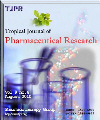
|
Tropical Journal of Pharmaceutical Research
Pharmacotherapy Group, Faculty of Pharmacy, University of Benin, Benin City, Nigeria
ISSN: 1596-5996
EISSN: 1596-5996
Vol. 4, No. 1, 2005, pp. 349-354
|
 Bioline Code: pr05004
Bioline Code: pr05004
Full paper language: English
Document type: Research Article
Document available free of charge
|
|
|
Tropical Journal of Pharmaceutical Research, Vol. 4, No. 1, 2005, pp. 349-354
| en |
Aqueous solubility of ciprofloxacin in the presence of metal cations
Suvakanta Dash, Lila Kanta Nath, Satish Bhise and Nihar Bhuyan
Abstract
Purpose:
Though the complexation of ciprofloxacin with metal cations has been extensively studied, the effect of this complexation on the aqueous solubility of ciprofloxacin which is an important factor affecting drug distribution has not been well documented. We have thus set out in this study to investigate the aqueous solubility of ciprofloxacin in the presence of metal cations.
Method:
The measurements were done spectrophometrically after shaking ciprofloxacin alone or in the presence of varying amounts of different metal cations for five hours to attain equilibrium. The amount of ciprofloxacin in the saturated solution in each case was then measured spectrophotometrically
Results:
The solubility of ciprofloxacin in 0.05M H2SO4 at 37.0 ± 0.2°C was 46.65 mgml-1 (0.12M). Except for magnesium sulphate, all the cations investigated progressively increased the aqueous solubility of ciprofloxacin. Ferrous ion had the greatest increase. It was followed by ferric, calcium and aluminium ions. Potassium and sodium ions had very slight increase in ciprofloxacin solubility. As the amount of magnesium sulphate increased, the aqueous solubility of ciprofloxacin increased slightly initially but then decreased progressively.
Conclusion:
The observed solubility profiles can be attributed to the type and extent of complexes formed between ciprofloxacin and the metal cations. This increase in the aqueous solubility of ciprofloxacin can have profound effect on the enteric absorption of ciprofloxacin and on its antibacterial activity when these metal cations are present, and may contribute to the observed poor availability and antibacterial activity of ciprofloxacin when co-administered with these cations.
Keywords
Ciprofloxacin, aqueous solubility, ciprofloxacin -metal cation interaction, antibacterial activity, gastrointestinal absorption.
|
| |
© Copyright 2002-2006. TJPR Faculty of Pharmacy, University of Benin, Benin City, Nigeria
Alternative site location: http://www.tjpr.org
|
|
